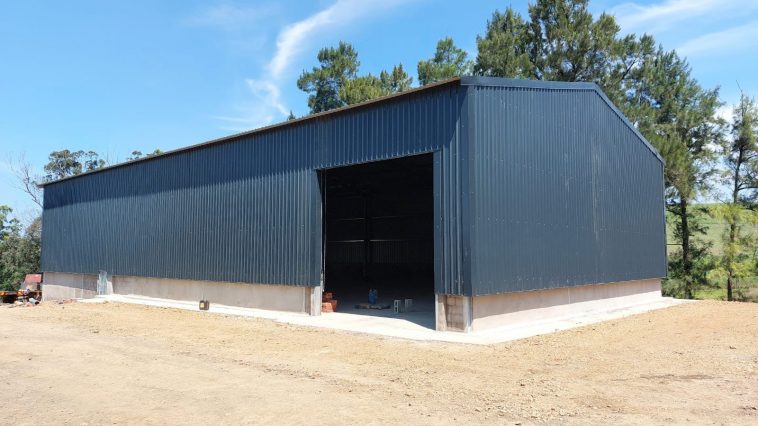Winterton Structural Steel has manufactured and erected quality, customisable steel structures for 17 years.
If you are looking to erect farm buildings, the material you choose to build in affects everything from cost and construction times to long-term customisation and sustainability. Whether you are housing livestock or storing equipment, stock, or produce awaiting processing, the versatility of steel makes it the perfect fit for agricultural operations.
Owner-operated, Winterton Structural Steel provides agricultural steel structures Africa-wide – with an unwavering commitment to quality and service excellence.
In comparing materials for your next farm building, here are the benefits you can expect from building in steel:

KOJO silo structure
Steel Is Durable and Long-Lasting
Probably the most attractive benefit of steel is that it is tough! In fact, it is one of the most durable materials available, which makes it especially suitable for agricultural applications. Weather-resistant steel is a match for almost anything you can throw at it – from withstanding the elements to the daily wear and tear and rough and tumble of storing livestock and heavy equipment.
In not needing to replace steel structures over time, steel structures can be considered more sustainable than less durable materials and a good use of farming resources. The fact that steel does not need to be replaced regularly has financial benefits – an investment for the future that offsets the initial outlay.
Steel Is Customisable
Not every steel project is made equal – and what we need from farm buildings today isn’t always the same in the future. Some require simple, standard steel structures that offer plug-and-play simplicity. Others may be more complex. The customisable nature of steel means it is adaptable to your farm’s changing requirements over time.
From custom initial designs to making modifications over time, steel stands to be exactly what you need today and into the future. This means you get the structure you need without any compromises.
Steel Requires Little Long-Term Maintenance and Repairs
The durability of steel means less maintenance and repairs in the long term. This results in reduced outlay on additional materials, handyman expenses, and labour – so you can focus more of your efforts and cash flow on daily operations.
Steel also has the obvious benefit of not being affected by pests like termites, ants, and beetles in the same way as structures with wooden components. It is also non-corrosive and is resistant to fire and condensation, which causes mildew, mould, and bacterial growth.
Steel Provides Exciting Design Opportunities and Flexible Functionality
The design flexibility of steel lends itself to functional flexibility too. The strength of the material means you can have the option of large, columnless interiors, for example. This creates a world of possibilities around what these structures can be used for. Uninterrupted interiors also allow farmers to optimise storage and packing space.

Potato pack house
Some of the more common applications include:
- General purpose farm buildings. A dry, weatherproof area that can be used for shifting needs.
- Machinery and equipment storage. Protect farm equipment and tools by locking it away and keeping it out of the elements.
- Livestock shelter.
- Crop storage. Keep crops dry, fresh, and protected while waiting for transport.
- Office space. Create custom office space as an administrative centre for farming ops. There is also potential to create residential structures as required.
- Equine applications. From training centres to stables.
Choose Steel – One Of The Most Reliable Building Materials On The Market
With more than 36 years’ collective experience in the manufacture and construction of steel structures, our team is best-placed to advise on your next farm building project. Get in touch to discuss your needs and for a free quote.
For more information contact them at 036-940-0124, admin@wss-steel.co.za or https://www.facebook.com/wintertonstructuralsteel









